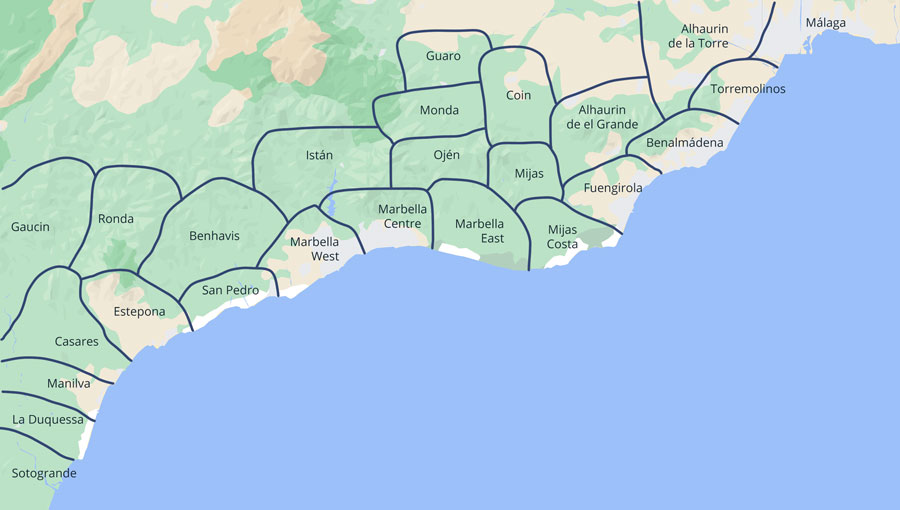Estate agents on the Costa del Sol
Live the digital nomad life
In the depths of winter the lure of a life in the warmth of southern Europe might be stronger than ever. Anyone who can work online has the freedom to roam and find a new lifestyle in a more welcoming climate.
Spain has long been a draw for those looking for a laid-back, good value lifestyle with short and mild winters and long sunny days near the beach. Imagine working in that sort of environment. Maybe an early morning start at the desk, a swim in the afternoon and a barbecue on the beach as the sun goes down. Tempted? Read on and see if the life of a Digital Nomad is for you.
The idea of digital nomadism has grown massively since COVID with more and more people freeing themselves from the traditional constraints of 9-to-5 work life and embracing their ability to escape traditional working arrangements and taking on ‘work from home’ positions.
Currently 3.2 million self-employed people live the autonomo (self-employed) life in Spain.
Conveniently, there is a well-developed infrastructure for WIFI spots, finding them in airports, public squares, beaches, bars, and restaurants and most will allow you to use their free WIFI service. Pop into a cafe, grab a coffee and do another hour’s work in between shopping and lunch! Most who have adapted to this new way of working would class this as ‘A Millennials’ Dream.’
Long days mean Spain offers a superior work-life balance compared to many other countries. Culturally, this also means Spaniards are less stressed, get to spend lots of time as a family and place great importance on socialising. Adapting to the Spanish lifestyle is a must!
The flexible digital nomad lifestyle bends to make time for sport and leisure opportunities; golf, tennis, pádel, soccer, rugby, riding and a whole range of other sports are very well-represented on the coast.
Whether you are thinking about basing yourself in one place or travelling around the country, Spain offers great opportunities. Want to know more? Read our next blog ‘Digital Nomad Moving to Spain’
How to adopt the digital nomad life
On the Costa Del Sol on average there are 360,000 registered British residents. Fancy joining them? If you work in the digital sector and location isn’t an issue for you, this is a real opportunity.
Since the beginning of 2021, things have drastically changed for UK citizens wishing to move to Spain. An immigration procedure that, before, lasted just a few days now requires time and patience. Nevertheless, British citizens can still get their residency visas in the country.
There are many companies on the Costa Del Sol that can help you with regards to becoming a resident. They know the process and can advise you from the beginning stages whether you are eligible.
Key steps:
One of the first things you should do once you decide to stay permanently in Spain is obtain an NIE (Número de Identificación de Extranjero / Foreigner's Identification Number).
You will then need to apply for a TIE (Tarjeta de Identidad de Extranjero), which will include getting a padron. It’s essentially a Spanish ID card and is proof that you are a Spanish resident.
Spanish residency (residencia) is not compulsory for EU citizens, but there are advantages if you plan to live in Spain on a permanent basis.
It is a good idea to open a bank account in Spain as soon as you can, especially if you are buying a property.
When applying for a TIE you will need to have health care insurance place as it is mandatory.
Stop press:
New labour laws, tax breaks, big changes for the self-employed and lots of promising employment news for foreigners means that 2023 will bring many developments for all types of people working in Spain. Read our next exciting blog ‘Developments for people working in Spain’






 We are proud to announce that The Spanish Estate Agent has been awarded Best Luxury Boutique Real Estate Broker 2025. This prestigious recognition reflects our unwavering commitment to excellence, personalized service, and exceptional results in the luxury property market.
We are proud to announce that The Spanish Estate Agent has been awarded Best Luxury Boutique Real Estate Broker 2025. This prestigious recognition reflects our unwavering commitment to excellence, personalized service, and exceptional results in the luxury property market.
